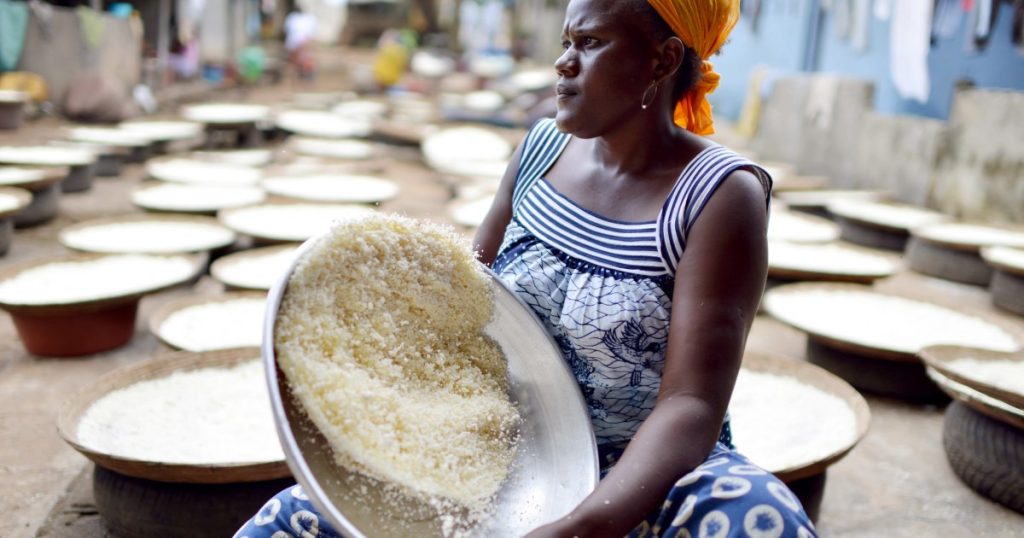Attieke, a fermented cassava meal deeply entrenched in Ivorian culture, has recently been recognized by UNESCO as an intangible cultural heritage, elevating its status alongside globally renowned culinary treasures like kimchi and tacos. This recognition underscores the dish’s significance not only as a staple food but also as a symbol of Ivorian identity and a source of economic empowerment, particularly for women who have traditionally prepared and sold it. The intricate, multi-day preparation process, passed down through generations, reinforces the cultural value and social bonds associated with attieke. Its inclusion in the UNESCO list acknowledges the unique knowledge and skills involved in its production and its central role in Ivorian social life, from everyday meals to celebratory occasions.
The UNESCO recognition of attieke highlights the meticulous techniques and traditional knowledge involved in its creation, a process often undertaken by groups of women. This communal aspect further strengthens the social fabric surrounding the dish, promoting collaboration and shared expertise. The recognition also serves to protect and preserve these traditional practices, ensuring that the cultural significance of attieke endures for future generations. Furthermore, the UNESCO listing emphasizes the dish’s accessibility and affordability, making it a cornerstone of Ivorian cuisine and a shared experience across various social strata. This universal appeal contributes to its status as a national symbol, unifying Ivorians through a common culinary heritage.
Attieke’s origins can be traced to the southern lagoon regions of Ivory Coast, specifically among the Adioukrou, Avikam, and Ebrie ethnic groups. The dish’s name itself is derived from the Ebrie term “adjeke.” While traditionally localized, attieke production has expanded across Ivory Coast and has gained popularity in neighboring countries and within the African diaspora. This growing demand has led to the development of pre-cooked versions, facilitating easier preparation and wider accessibility. The dish’s increasing presence beyond Ivory Coast’s borders speaks to its culinary appeal and its potential to become a globally recognized African food.
The preparation of attieke is a labor-intensive process, typically spanning three to five days and involving multiple stages. From the initial fermentation of cassava roots to the final steaming of the granules, each step requires specific skills and techniques. Traditionally, women collaborate in large-scale production, sharing the workload and ensuring consistency in quality. While industrial methods have been adopted for larger-scale production, the core principles of the traditional process remain essential for achieving the authentic flavor and texture of attieke. The meticulous nature of its creation contributes to the dish’s perceived value and its role as a culinary centerpiece.
The growing popularity of attieke has sparked some controversy, particularly regarding its production in neighboring countries. Some Ivorians view this expansion as a threat to their national identity, leading to debates about authenticity and ownership. The Ivorian government’s efforts to trademark the name “Attieke des Lagunes” and its production methods reflect the desire to protect the dish’s cultural heritage and prevent its appropriation by others. This move underscores the deep emotional connection Ivorians have with attieke and their determination to maintain its association with their national identity. The granting of Protected Geographical Indication (PGI) status by the African Intellectual Property Organisation further solidifies Ivory Coast’s claim to attieke as a unique cultural product.
The UNESCO recognition of attieke places it in the esteemed company of other African culinary traditions that have received international acclaim. Alongside the Senegalese dish thiebou dieune, attieke represents the rich and diverse food culture of sub-Saharan Africa. This recognition not only celebrates the unique flavors and preparation techniques of these dishes but also highlights their cultural significance within their respective countries. The inclusion of attieke in UNESCO’s intangible cultural heritage list serves as a testament to its enduring importance in Ivorian society and its potential to become a globally recognized symbol of African cuisine.

